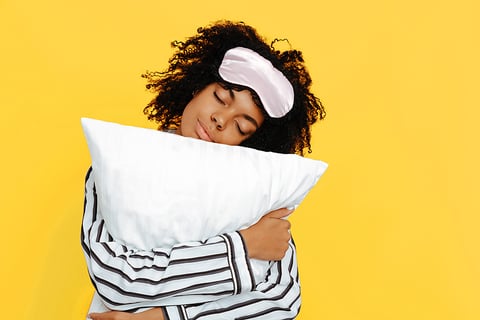 Are you always tired?
Are you always tired?
It may be time to take a look at your sleep patterns and practices.
Getting quality shut-eye is about more than sleeping in a dark room with a comfy bed. It’s all about what you do in the hours and minutes leading up to sleeping — even what you do as soon as you wake up can impact your sleep later.
Why does sleep matter so much?
Lack of it can deplete energy, minimize work productivity, and reduce the brain’s ability to retain information. It also costs employers big money when employees are exhausted or even falling asleep on the job.
So, we asked sleep experts: “What's the best way to get a restful night of sleep?”
Below, you’ll find their answers and advice on how to sleep better at night.
Let it Go
“Before you get in bed, make a list of things you need to do that may be on your mind. If those thoughts come up, remind yourself that they’re on the list so you don’t have to worry about them.”
— Jeanine Joy, Ph.D., lead sleep researcher at www.SleepTips.org
Get Your Sweat On
“Not only is exercise good for your overall health, it’s great for your sleep health, too! When it comes to the timing of exercise, exercising around six hours before you go to bed may be more beneficial for sleep due to the timing of the rise and fall of your body temperature — but all exercise is good exercise! I would suggest trying to avoid rigorous exercise too close to bedtime since this may actually delay sleep onset.”
— Martin Reed, certified clinical sleep health educator and founder of Insomnia Coach
Consistency is a Must
“When it comes to sleep, consistency is key. A recent study found that greater consistency of sleep in college students is associated with better grades. This means that individuals who go to sleep and wake up at approximately the same time every day tend to show better performance, while those who have irregular schedules tend to perform worse. So, try to adjust your bedtime and wake time so that they were more consistent — and see how this will make you more productive!”
— Julie Lambert, sleep expert at HappySleepyHead
Dim the Lights
“For the majority of people, changing your light environment is going to have the most immediate and significant impact on your sleep. One hour before you get into bed, don't just turn off your screens; turn off your overhead lights as well. Instead, use candles. This simple change is extremely doable, and will help transition your body and mind from the hustle and bustle of the day to quality, restorative sleep.”
— Brody Elkins, head sleep coach at Let’s Just Sleep
Bring on the Natural Light
“The most important practice I recommend for getting a restful night of sleep is getting some bright light exposure during the morning. Not only will the light signal to your brain that it's daytime, but a brain signaling compound called serotonin is also built up. Before nighttime, serotonin converts to another brain signaling compound called melatonin. Melatonin helps you fall asleep quickly, stay asleep, and improves sleep quality.”
— Bart Wolbers, researcher and chief science writer at www.Alexfergus.com
Create a Proper Sleep Practice
“Practicing proper sleep hygiene is critical to get a restful night's sleep — not just one night — but seven days a week. Best practices for sleep hygiene include: establishing a relaxing bedtime routine, creating a strict sleep schedule, and making sure your sleeping environment compliments your specific sleeping needs.”
— Christine Huegel, sleep expert at Mattress Advisor
Do a Little Stretching
“I’d recommend individuals engage in light stretching exercises about 15-30 minutes before you lay down. It’s often difficult to fall asleep when your muscles are tense and tight. If you go to bed tight, you’ll likely end up tossing and turning frequently in order to find a comfortable position. Stretching will help loosen up your muscles and get your body in a relaxed state for sleep.”
— Matthew Ross, Co-founder of My Slumber Yard
Have a Consistent Sleep Schedule
“Your body thrives on routine and schedule. And the more routine you give it, the better it adapts to it. Sleep is no exception. Following the same sleep schedule (same bedtime, same awake time) every day sets up your internal clock to do most of the work for you! It will start to cue you when it's time for bed, and it will wake up much easier in the morning. Plus, it will take less time to fall asleep and get you the most recovery benefits from your sleep!”
- Candice Seti, Psy.D., CPT, CNC at The Insomnia Therapist
Sleep Does the Body Good
There’s no such thing as “catching up on sleep” being a good thing.
If you want to know how to sleep better at night, it comes down to developing a healthy sleep practice that’s consistent with what your body needs.
Quality, quantity, and consistency of sleep matter, which is why developing a routine sleep practice is a must to maintain the health benefits of sleep. Getting enough of it in long stretches is critical for your employees to feel energized and alert.
Remind them that sleep is just as important as a healthy diet and regular exercise because we spend at least one-third of our lives sleeping.
And if your employees still find that adequate sleep but still feel exhausted each day, it may be time for them to see if other health issues — like sleep apnea — are getting in the way of quality sleep.
Send them home with literature from organizations like the National Sleep Foundation to help them explore and better understand the role sleep plays in their health.
As the holidays near, workers will feel more time-crunched than ever, perhaps even pulling all-nighters to get work done before the year ends. Minimize the workplace pressure by asking your wellness committee to consider creating a healthy sleep campaign; it will serve as an excellent reminder that sleep health matters, too.
Learn more about why your employees’ quality of sleep matters. Check out our post Should You Care How Much Sleep Your Employees Get?



